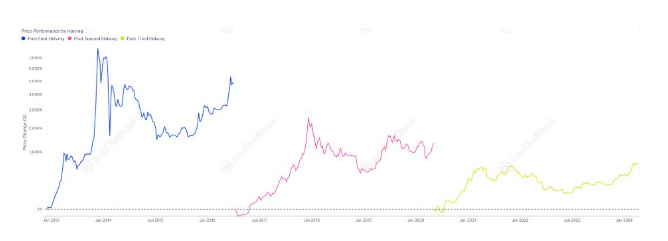There’s no denying the launch of Spot Bitcoin ETFs has done wonders for the price of Bitcoin and other cryptocurrencies in general. These ETFs have now unlocked institutional demand into the world’s largest crypto asset to change the dynamics ahead of the next halving. On the other hand, recent tensions between Iran and Israel have seen Bitcoin falling to as low as $61,000 in the past 24 hours to undo weeks of price increases.
Bitcoin ETF Wallets Now Whale Addresses
The institutional demand for Bitcoin has been ramping up since the beginning of the year from the issuers of the various Spot Bitcoin ETFs. These fund providers have been scooping up Bitcoin left and right, now holding 4.27% of the total BTC supply, as noted by on-chain analytics platform IntoTheBlock.
These whale wallets have now joined an extensive list of whales on the Bitcoin network who collectively own 11% of the total circulating supply.
Unlike past BTC halvings, this time there’s a new source of demand coming from the traditional institutional sector.
The newly introduced Bitcoin ETFs drive institutional demand, leading to ETF wallets already amassing 4.27% of the Bitcoin supply! pic.twitter.com/volLU15Wgd
— IntoTheBlock (@intotheblock) April 13, 2024
It is noteworthy to mention that BlackRock’s IBIT and Fidelity’s FBTC ETFs have positioned themselves as the lead of the pack. According to data from BitMEX Research, these two spot ETFs now hold 405,749 BTC at the close of the trading session on April 12.
This surge of institutional money has fueled Bitcoin’s meteoric rise to a new all-time high of $73,737 and underscored its potential as a mainstream asset class. However, a brewing conflict between Iran and Israel seems to be undoing months of this price increase. Particularly, Bitcoin has seen a noteworthy drop to $61,000 from $67,800 in the past 24 hours.
Fundamentals, however, point to this price drop being temporary and the crypto is already reversing the majority of this loss. At the time of writing, Bitcoin is trading below the $65,000 price mark.
Changing Halving Dynamics
One of such fundamentals pointing to a steady Bitcoin price increase in the coming months is the approaching Bitcoin halving. Investors are steadily approaching the outcome of this halving, with the Bitcoin blockchain now less than 1,000 blocks to the next event.
Past halvings on their own have led to a price increase for Bitcoin in the days post-halving. Bitcoin went on a surge of over 7,000% in the months after the first halving in 2012. The halving in July 2016 led to a 3,000% price surge in the months after. The most recent halving in May 2020 led to a surge of almost 1,000% in the months after.

As noted by IntoTheBlock, the approaching halving is different from previous ones. Unlike the last three halvings, there’s “a new source of demand coming from the institutional sector” through Spot Bitcoin ETFs. A repeat of past halving outcomes could see Bitcoin easily surging above the $100,000 price level.
Featured image from Pixabay, chart from TradingView





